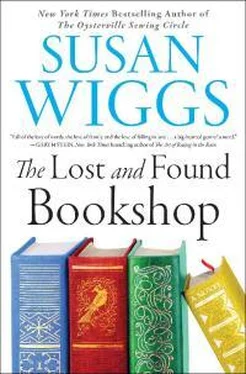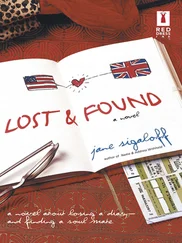The question haunted her as she drove south. She arrived in the city late at night and crawled into her mother’s bed. She hated that this was her story. She hated that her mom’s story ended this way. Maybe this was the reason she was so determined to turn the shop’s fortunes around—to give her mother a better ending.
She picked up the book on the nightstand— Acts of Light . The book her mom had been reading before she died. Mom had had a habit of marking passages she liked or wanted to remember. Natalie paged through several. One of them, tagged with a stick-on page marker, jumped out at her: How would you live your life differently if you could start over, what would you do, who would you be, where would you go, what would you embrace?
* * *
Natalie sat in the bookstore back office with Bertie and Cleo, trying to stave off a full-blown panic attack.
“We’re staying open,” she said. “I’m going to figure out a way to make it work. Grandy won’t sell, and he refuses to move, and I’m not going to force him. So I’m going to make this the best damn bookstore on the West Coast.”
The show of bravado sounded strange and hollow, coming from a place of desperation. She wished she felt more conviction.
The impulse to walk away from her life had been the most momentous decision she’d ever made. And yet she’d made it on sheer whim, like switching from soy milk to cream in her latte. Normally, she would analyze a decision to death. Not this time. She had thrown away a stable, lucrative job to embrace a failing enterprise with no safety net.
In between the anxiety attacks and sleepless nights, she felt a soaring sense of elation, as if she could fly. It was probably the sense one felt after jumping off a cliff.
Leap, and the net will appear. That had been her mother’s motto, copied in calligraphy from a Julia Cameron book. Judging by the shape of her finances, Blythe had lived her life that way. In the end, there was no net—in the most literal sense of all.
“There’s no turning back,” Natalie told the two of them. “I quit my job, and now I’m doing this thing and it’s terrifying but I’m determined. I’d love it if you could stick with the shop. I’ll do my best to make it worthwhile. If you can’t stay, I’ll understand.”
Cleo and Bertie exchanged a glance, then looked at her. They were both such kind people. Natalie was glad they were in her life. And that reminded her of how small her life had shrunk. Her grandfather. A few friends. And yet it felt rich. Meaningful.
“I’ll tell you the same thing I told your mother,” said Bertie. “If my breakout role comes along, I might need to move on. Otherwise, I’m here.”
She paused, studied him. Bertie Loftis was a striver and a romantic. He’d won roles in productions, everything from Rent to Samuel Beckett. He had a huge talent and a passion for acting. In the heartbreaking profession to which he’d devoted his life, that wasn’t always enough. “You’re so talented,” she said. “Your acting gives me chills. I’m amazed you’re not headlining somewhere.”
“Just haven’t found that sweet spot—the right role at the right time. And a giant helping of pure, unadulterated luck.” He braided his fingers together and stared down at his hands. “My acting coach says it’s fear. Acting in a role forces you to show the world who you really are. He says I have a block against going there.” He leaned back in his chair. “Could be my breakout role is right here, reading Horton Hears a Who! to the Tuesday Tots. And there are times when I could be completely happy with that, I swear. If the rent wasn’t so damn high in the city, I probably would be.”
“Blythe used to say you’ll never be happy with what you want until you can be happy with what you’ve got,” Cleo said.
What Natalie wanted was unreachable—for Grandy to be all right. What she had was a man whose memories were fading and who was suffering from mysterious physical symptoms the doctors couldn’t explain. “Moving right along,” she said. “I’ve been looking for ways to get our revenues up. Contrary to the naysayers, bookselling is not dead. We need the bookstore to be more than a bookstore. Mom relied so much on the long-term customers she loved. I think we can build on it.”
“Cool,” said Bertie.
“How can we help?” asked Cleo.
“I’ve been doing the analytics on revenues. And I think I see a way to bring in more sales.” Digital inventory management was not sexy, but it did come in handy. Her skills had kicked in as she took a deep dive through the shop records. She had stayed up late, checking for trends to see if she could find a way to improve the numbers.
“I found a pattern that makes sense to me. A spike in sales occurs when a much-anticipated book is published. We need to settle the unpaid accounts with publishers and get those books on the shelves. I also noticed a spike when there’s an author event. And obviously, the more popular the author, the higher the sales.”
Cleo nodded. “So let’s organize an author event.”
“Specifically, a children’s author. We can vouch for that,” Bertie said. “Kids come with adults. So that means the adult might buy a book, too.”
“Exactly. I want to kick off this new phase with a major author event.” In spite of everything, she felt a soft uptick of optimism.
“Right, then. All we need is a major author,” said Cleo. “Who did you have in mind?”
She remembered the sprightly Dorothy. “Trevor Dashwood,” she said. “He’s perfect, right?”
“And impossible to book,” said Bertie. “We’d have better luck getting Harry Potter himself.”
“Harry Potter is fictional.”
“And easier to book than Trevor Dashwood. Seriously, the guy is on fire.”
Natalie took out a number and dialed. “I have the name of his booking agent. I’m going to give it a try.”
After a few rings, someone picked up. “Candy and Associates.”
Natalie had to make her way through a few of the associates. Then she found someone named Emily and made her request. “We’re a full-service bookstore in the heart of San Francisco, and we’d like to organize an event with Trevor Dashwood.”
“He’s scheduling events two years out,” said Emily. “I can send you a request form—”
“Oh, gosh.” Natalie’s heart sank. “I was hoping for something later this month. It says on his webpage that he lives in California, so—”
“I’d love to help,” said Emily. “But honestly, he’s fully committed for the next two years.”
“But—”
“I’ll email you the request form. I’m sorry. It’s the best I can do.”
* * *
The rest of the day revealed more frustrations as it unfolded. Natalie contacted publishers about other authors, but the ones who could draw a crowd were booked up as well. She also discovered more unpaid bills from publishers.
“My God, Mom,” she muttered. “How the hell did you manage?” She rolled her chair back and glared at her mother’s desk, a bright collage of Post-its and pinned notes, stacks of books, a bin of still-unopened mail. The spines of the books displayed tantalizing titles: The Never-Again Club. One Hand Clapping. Life Among the Elephants.
She noticed a slip of paper protruding from a book like a sliver of hope. She extracted the book and set it in front of her. Maybe, Maybe Not by Quill Ransom. A pen name, probably. No author photo. The cover art showed a person on a tightrope, but more importantly, an embossed medallion designating a literary prize.
Natalie opened the note. It was a personal letter from the author. “. . . scheduling bookstore events this fall” were the magic words she was looking for. She looked up the account with the publisher and it appeared to be paid up. It wasn’t a children’s book, but it checked all the other boxes. Encouraged, she sent an email to the author and publicist.
Читать дальше












